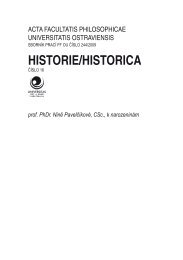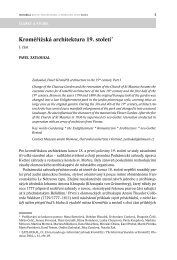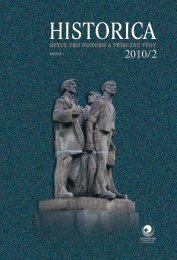Stáhnout PDF - Ostravská univerzita v Ostravě
Stáhnout PDF - Ostravská univerzita v Ostravě
Stáhnout PDF - Ostravská univerzita v Ostravě
Create successful ePaper yourself
Turn your PDF publications into a flip-book with our unique Google optimized e-Paper software.
SummaryThe Seven Deadly Sins in the works of Tomáš of Štítný and PetrChelčický in the context of the development and shaping ofChristian Morality in the Middle AgesJana GrollováA decisive role in the history of Christianity was played by the social changes caused by thebirth and emancipation of towns and their citizens in the Medieval world. Furthermore, thelong term process contained within itself a struggle for the codification of basic socializationschemes. Among these was the moulding of demands for ethical behaviour by human beings.The basis of Christian morals in the sense of individual and social reflection of the periodtheology and religious practice, shows differences between the level of theoretical intellectualdiscussion and the daily practical experience of believers. While the theoretical basis of socalled Christian morals can be interpreted by biblical texts in the sense of the theological-anthropologicalstructure of ethics, period practice shows far more variety caused by the influencenot only of other religious cults, but also by the continuing coexistence of Christianityand paganism in early Medieval Western Europe.The shaping of the doctrine of the Seven Deadly Sins represented one of many opportunitiesof reflecting the medieval formation of Christian morals. The specific environmentof the Czech countries at the end of the 14th and beginning of the 15th centuries offers thescholar dealing with the history of Christian devotion and morals, interesting reflectionsand impulses and eventually attempts to enforce changes in medieval behaviour. From thewide range of medieval authors who were concerned with the problem, I chose two lay men –Tomáš of Štítný and Petr Chelčický. My interpretation of the Seven Deadly Sins comes fromthe confrontation of two texts: a tract by Petr Chelčický O sedmi smrtelných hřieších (Onthe Seven Deadly Sins) from the so called Paris manuscript and the closing chapters of Řečibesední (The Conversations) by Tomáš of Štítný.The two lay intellectuals are, however, separated by contemporary religious questionsbut in the core of their approach and the bases for solving these period questions, they bothcome from devotion with a mystical tone. Nevertheless, the results they deduce for dailyChristian life are, in their understanding of the moral and form of devotion, different. WhileŠtítný struggles to arrange for the reader the contemporary theological knowledge and itspractical application into daily Christian life on the basis of emphatic self-education andindividual personal development, Chelčický is orientated more on the social relationshipsbetween believers and in the results analysis, he shows to his reader the origin of disunion inthe Catholic church in the violated relationship not only between the human being and Godbut also between the human being and his social enviroment.(Translation by Daniela Rywiková)40










